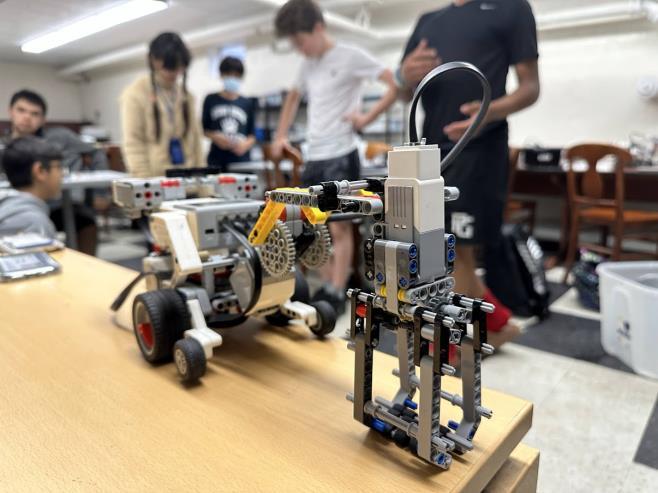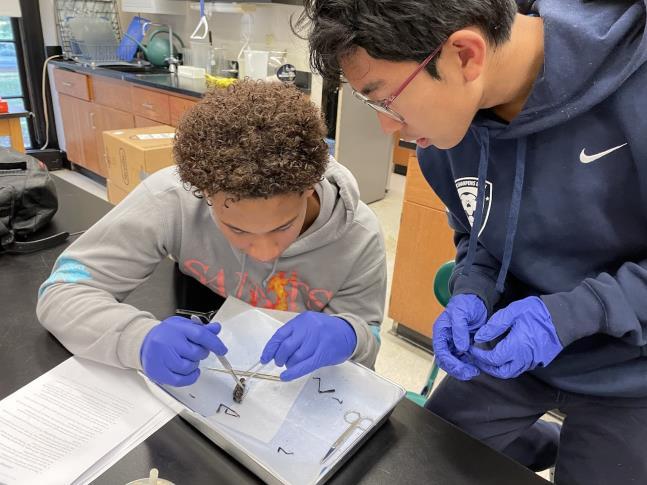
5 minute read
Science Department
S.310/ AP Psychology
Prerequisite: B+ in previous high school science course and completion of Physics or Chemistry and at least concurrently taking 3rd science course Open to 11th and 12th graders only AP Psychology is equivalent to an introductory college course in psychology. The goals of the course are to understand foundational concepts of psychology and to increase self-awareness. Many ideas from psychology help to shape our culture and our experience in everyday life. This course seeks to look at some of these ideas, and to understand and critique them. The course will be discussion-oriented and as practical as possible. Students will be challenged to apply what they are learning to their lives where appropriate. Note that this nonlaboratory course does not fulfill a science requirement for graduation. (1 credit)
S.307/ AP Physics C: Mechanics & Electricity and Magnetism
Prerequisites: Students should have taken AP Calculus AB or BC or be concurrently taking AP Calculus BC. If already taken Physics Honors can take concurrently with AP Calculus AB or BC Mechanics is equivalent to a one-semester, calculusbased, college-level physics course, especially appropriate for students planning to specialize or major in physical science or engineering. The course explores topics such as kinematics; Newton’s laws of motion; work, energy and power; systems of particles and linear momentum; circular motion and rotation; and oscillations and gravitation.
Introductory differential and integral calculus is used throughout the course. Labs comprise approximately 20% of the course. Electricity and Magnetism is equivalent to a semester-long, introductory calculus-based college course and covers electrostatics; conductors, capacitors, and dielectrics; electric circuits; magnetic fields; and electromagnetism. Introductory differential and integral calculus is used throughout the course. Students who complete this year-long course will be prepared to take both AP Physics C exams. Labs comprise approximately 20% of the course. (1 credit)
S.320 Advanced Scientific Research
Open to 11th and 12th graders by application
This is an application-only elective course for highly motivated students who are interested in scientific research. Students will learn to read and write research papers and begin to develop research methodology. To be selected for this class, students should submit an application outlining their research project to the Academic Office. (1 credit)
S.320 Advanced Scientific Research: Internship
Open to 11th and 12th graders by application
Advanced Scientific Research is an application-only elective course where highly motivated and successful students pursue a rigorous scientific research project, typically at a university or outside research facility. Overseen by a member of the Science faculty, students submit weekly progress reports on their research and prepare a presentation and written summary of their project. Students are responsible for their own travel, logistics and expenses. To be selected for this class, students should submit an application outlining their research project to the Academic Office. (1 credit)
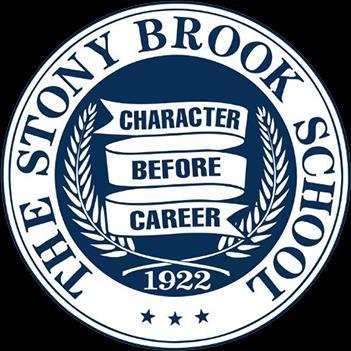
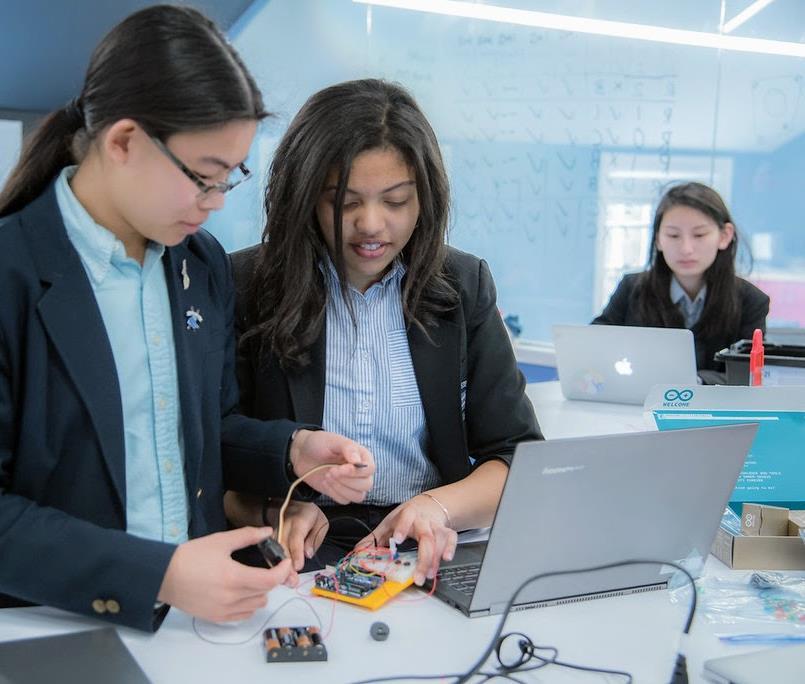

T.120/ STEM Fundamentals: Robotics (Fall
and Spring Semesters) [LH]
Open to students in Grades 9-12
This course is a semester-long course in which students design robots and learn to write basic code in order to accomplish physical robotic challenges. The level of complexity of both robot builds and coding will increase based on the ability and experience of the individual student (0.5 credits). T.121/
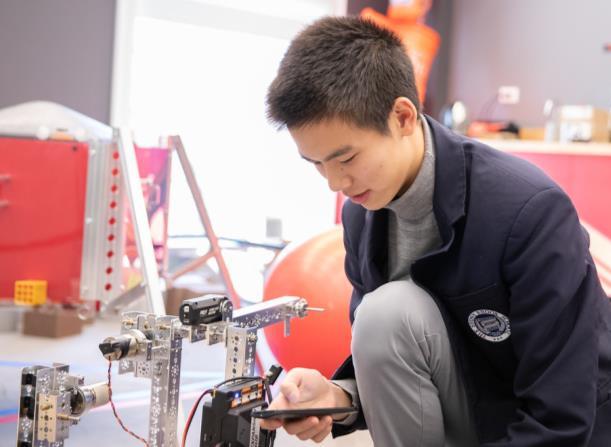
T.221/ Advanced 3D Modeling & Printing [LH]
Open to students in Grades 10-12; prerequisite T.121 or T121 (preference given to upperclassmen)
This year-long course is a continuation of T.121, 3D Modeling and Printing. This project-based course focuses on design, modeling, and fabrication using 2D and 3D modeling software, 3D scanners, 3D printers, and a laser cutter. (1 credit)
Printing (Fall and Spring Semesters) [LH]
STEM Fundamentals: 3D Modeling and
Open to students in Grades 9-12
This course teaches the basics of 3D modeling and printing. Students will learn how to design and create using computer aided design (CAD) 2D drawings and 3D models. In addition, they will learn to slice and prepare solid body models for printing on both FDM additive printers as well as resin UV light printers. (0.5 credits)
T.223/ Advanced Computer Programming (Fall and Spring Semesters)
Open to students in Grades 9-12; Prerequisite T.123 or T123

T.123/ STEM Fundamentals: Computer Programming (Fall
and Spring Semesters) [LH]
Open to students in Grades 9-12
Students will learn the basics of drawing and animation in the computer programming language, JAVA Script and the basics of creating their own web pages using HTML and CSS, through an online, interactive course. The course will be self-paced, starting with Khan Academy or Code.org and advancing to other platforms according to student interest and ability. (0.5 credits)
This is CS50x, Harvard University's introduction to the intellectual enterprises of computer science and the art of programming for majors and nonmajors alike, with or without prior programming experience. This is an online course which teaches students how to think algorithmically and solve problems efficiently. Topics include abstraction, algorithms, data structures, encapsulation, resource management, security, software engineering, and web development. Languages include C, PHP, and JavaScript plus SQL, CSS, and HTML. Problem sets inspired by real-world domains of biology, cryptography, finance, forensics, and gaming. (0.5 credits)
T.225/ Advanced Robotics Competition [LH]
Prerequisite: Teacher Recommendation and Completion of T.120 or T120 or AP Computer Science A or other significant Robotics’ experience
In this course, students will plan, design and program robots or robot subsystems to accomplish tasks that revolve around yearly FIRST Tech Challenge (FTC) competitions. Robots are primarily constructed using aluminum extrusion. 3D modeled parts will be designed, printed, and implemented as needed. Students will learn to determine the appropriateness of a variety of motors, servos, and sensors in different applications. Programming will focus on advanced motor, servo, and sensor control and requires a strong background in Java and mathematics. (1 credit)
T.270/ Advanced Engineering Innovation & Design I [LH]
Prerequisite: Completion of one full year of upper school STEM course (other than programming), or teacher’s recommendation

This is a project-based course where students will work on independent or collaborative projects in their area of interest using skills acquired in prior STEM courses. (1 credit)

T.271/ Advanced Engineering Innovation & Design II [LH]
Prerequisite: Completion of Advanced EID I and teacher's recommendation.
This course is a continuation of Advanced EID I, with projects commensurate with a student’s experience level.
(1 credit)
T.272/ Independent Advanced EID Project [LH]
Prerequisite: Completion of Advanced EID II and teacher's recommendation.
This course is an extension of Advanced EID II for highly motivated and successful students in engineering.
(1 credit)
T.330/ AP Computer Science A Prerequisite: A in Advanced Computer Programming
As per the goals of the course as stated on the College Board website, students will design, implement, and analyze solutions to problems. They will use and implement commonly used algorithms and develop and select appropriate algorithms and data structures to solve new problems. Students will write solutions fluently in an object-oriented paradigm as well as write, run, test, and debug solutions in the Java programming language, utilizing standard Java library classes and interfaces from the AP Java subset. They will read and understand programs consisting of several classes and interacting objects and read and understand a description of the design and development process leading to such a program. Ethical and social implications of computer use will be discussed. (1 credit)
T.340/ Redemptive Entrepreneurship
*This course is taught virtually with live students and faculty by Gravitas
Open to students in Grades 9-12

This is a year-long fully online course in which students receive an inspiring, hands-on experience in technology, design, and faith-driven entrepreneurship while being empowered through building essential skills. The curriculum consists of interactive project-based activities; guest lectures from industry professionals; use of the design thinking process to empathize, define, ideate, prototype, test, and iterate to create products or services that are ethical and impactful; case studies of real-world companies; research, design, production, and fundraising activities culminating with students launching real-world solutions to social issues or problems (e.g. UN SDGs). The students will also participate in a "pitch event" with top teams having the opportunity to compete in business, pitch, and app challenges around the world and have real opportunities to take their idea to the market.
In this course, students “learn by doing.”
Increasingly, skills that are needed for the digital age and today’s workforce include creativity, innovation, technological literacy, collaboration, critical thinking, problem-solving, systems thinking, entrepreneurship, and cross-cultural literacy. These kinds of skills are often best cultivated in problem-based learning approaches that ask students to design solutions to real-world problems. (1 credit)
